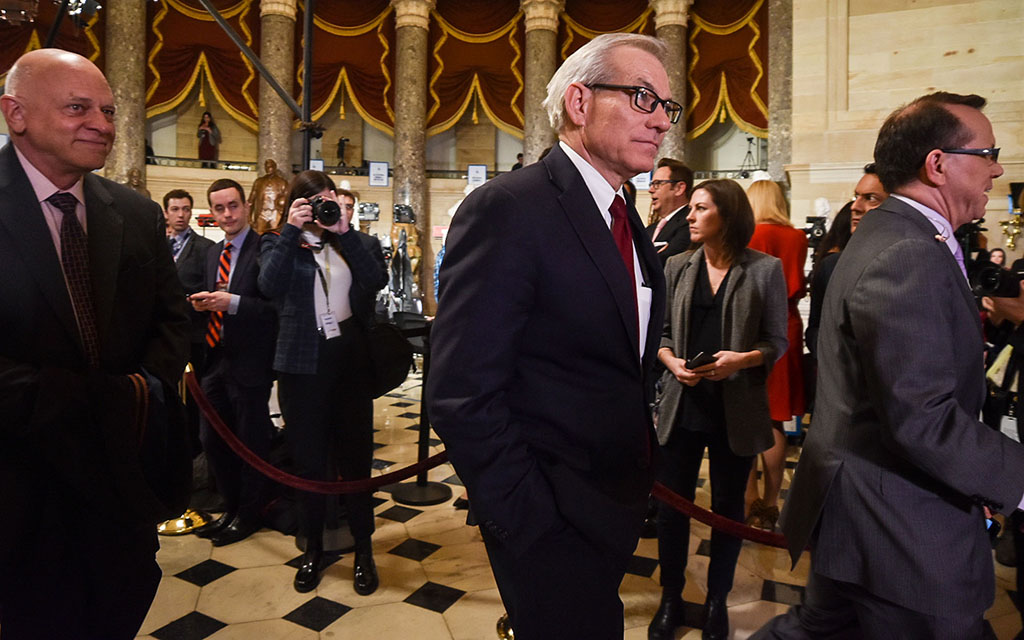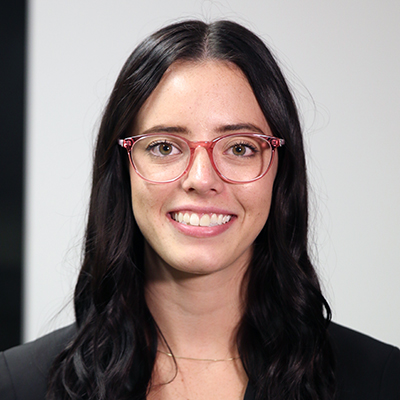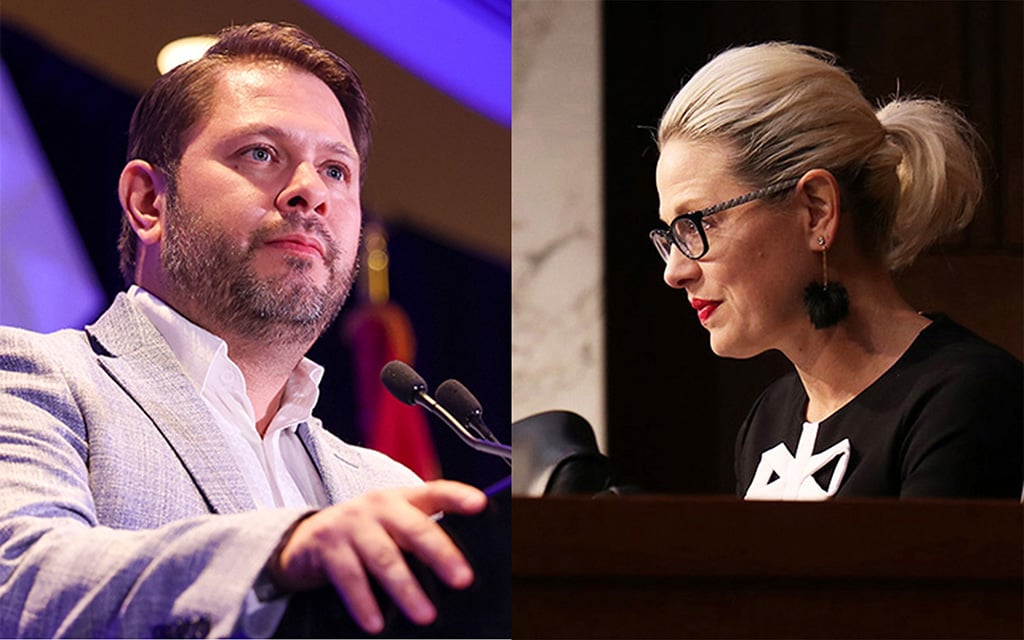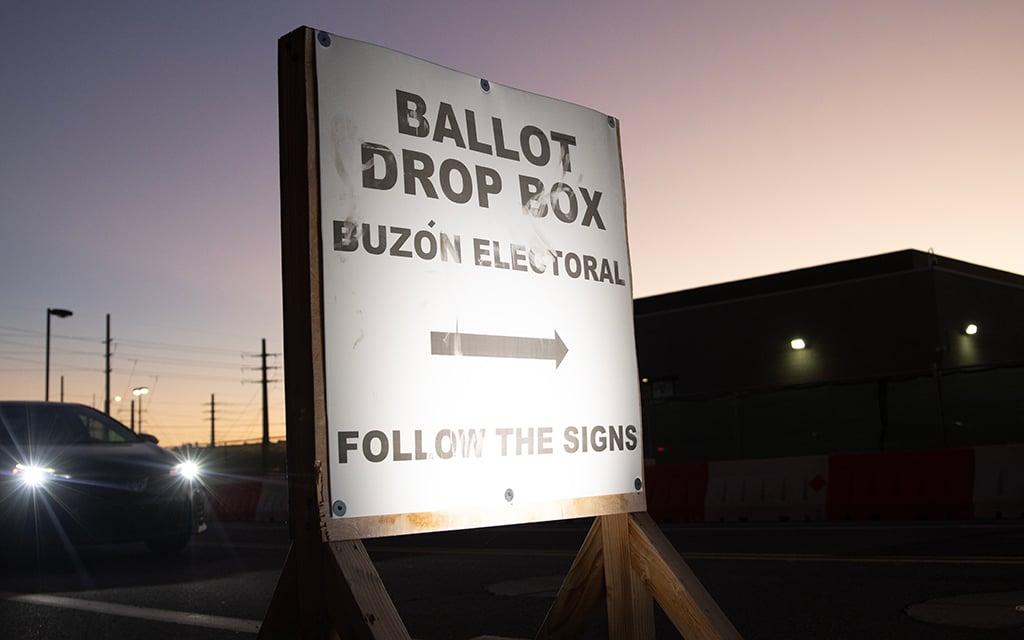
Five Democrats are already running to unseat Rep. David Schweikert, R-Fountain Hills, in 2024. The seven-term incumbent, shown in a 2020 photo, is considered one of the state’s most vulnerable House members – but analysts say the number of Democrats running could work to his advantage, since they will have to spend time and money on a primary. (File photo by Christopher Scragg/Cronkite News)
WASHINGTON – Arizona is expected to be a battleground for presidential and Senate races in 2024, but it’s looking as if the state could also have some high-profile House races.
With a year until the primary, candidates for just three seats have already raised more than $7.6 million, according to Federal Election Commission reports, as an open seat and a number of targeted House races are drawing numerous hopefuls.
In all, incumbents and challengers for the state’s nine House seats reported raising more than $9.3 million as of June 30, according to FEC reports.
Most of that money has been raised in District 1, the Scottsdale, Fountain Hills and Cave Creek district represented by seven-term Republican Rep. David Schweikert. But Schweikert has won re-election by increasingly narrow margins, culminating in his 2022 victory over Democrat Jevin Hodge by just over 3,000 votes.
That has drawn a lot of Democratic interest: Five Democrats have already announced bids for Schweikert’s seat.
“That’s a very affluent district,” said Rodd McLeod, an Arizona political campaign strategist. “There is a lot of money there and so you’re going to have a pretty busy and dynamic primary there.”
There is already a lot of money. Schweikert had more than $634,023 cash on hand as of June 30, which puts him between Democratic challenger Andrei Cherny’s $557,554 in the bank and well short of the $852,083 held by Democrat Andrew Horne – who pumped more than $700,000 of his own money into the race.
Other Democratic challengers include Dr. Amish Shah with $368,438 cash on hand; Marlene Galán-Woods, who only entered the race in late May, had $274,302 available; and Kurt Kroemer, who reported $142,656 in the bank.
Sean Noble, a political consultant for Compass Strategies, thinks the large number of Democrats running in District 1 will hurt each other – and the party – more than they hurt Schweikert and the Republicans.
“I think the Democrats have hurt themselves by making this such a crowded primary,” Noble said.
Ben Petersen, a Western press secretary for the National Republican Congressional Committee, predicted the Democratic primary will result in a “chaotic, costly race to the left” that will produce a nominee who will “fall flat with Phoenix and Scottsdale voters.”
Schweikert’s seat is listed as one of two toss-ups in Arizona, along with the 6th District seat held by freshman Rep. Juan Ciscomani, R-Tucson. Inside Elections said those two seats are in play but tilt Republican. But David Wasserman, senior editor for Cook Political Report’s House analysis team, said Schweikert’s been in this position before.
“Schweikert is perennially in rough financial shape and yet usually finds a way to get by,” said Wasserman, noting that Arizona’s Aug. 6 2024 primary gives Schweikert time to raise funds to stay competitive. “This next cycle looks like no exception.”
Money does not appear to be a challenge for Ciscomani, who reported raising $1.8 million, more than half of which was from individuals, according to his FEC filing. That was 19th-most among House candidates for this cycle, and he reported having more than $1.6 million on hand as of June 30.
(Graphic by Lauren Irwin/Cronkite News)
Noble thinks that of 77 freshmen legislators elected in 2022, Ciscomani may be in the best position to earn a second term.
“He’s done a very good job on the fundraising side,” Noble said. “I think the Democrats are going to have a really hard time taking him out.”
But the Democrat who came close to beating Ciscomani in 2022 plans to try. Former state Sen. Kirsten Engel lost to Ciscomani by 5,232 votes out of almost 350,000 cast in that election. Engel has raised $432,794 since announcing her candidacy in April and had $354,866 on hand as of June 30.
Erin Covey, a reporter and analyst for Inside Elections, calls Engel’s fundraising “average, so far.”
“That’s nothing particularly impressive, but it’s not super low either,” Covey said. “I would say she’s probably in the middle of the pack among the Democratic challengers in these competitive House races.”
Another competitive House race in Arizona will be the primary for the solidly Democratic District 3 seat held by Rep. Ruben Gallego, D-Phoenix, who announced a bid for Senate next year. Four Democrats have already filed to run for the seat, which is centered on the downtown Phoenix area.
Phoenix Vice Mayor Yassamin Ansari has raised the most, bringing in $510,229 and having $412,730 on hand. She is trailed by former state Sen. Raquel Terán, a former chair of the Arizona Democratic Party, who reported raising $206,037 and having $158,830 available for her campaign.
Laura Pastor, the daughter of former Rep. Ed Pastor, raised $116,001 and had $106,825 on hand. Ylenia Aguilar, a formerly undocumented single mother and school board member, raised $59,770 and still had $56,319 to spend.
Analysts say Arizona’s other House districts are relatively safe. Sprawling District 2, which covers much of northern and eastern Arizona, is likely to be held by freshman Rep. Eli Crane, R-Oro Valley, who has raised $893,893 this cycle. Rep. Greg Stanton, D-Phoenix, could face a rematch against Republican Kelly Cooper in District 4. But Stanton has raised $630,734 to Cooper’s $155,747.
Rep. Andy Biggs, R-Gilbert, is expected to win reelection to the solidly Republican District 5 seat he has held since 2017. Biggs had raised $394,309, the only candidate in the district to report raising money this cycle. Neither Rep. Debbie Lesko, R-Peoria, nor Rep. Paul Gosar, R-Bullhead City, had challengers who reported raising any money, Lesko said she had raised $264,696 in this cycle and Gosar had brought in $179,315.
No one has stepped forward to challenge 11-term Rep. Raúl Grijalva, D-Tucson, who reported raising $116,057 in this election cycle.
“It’s going to be really intense and busy, we’re going to have a big Senate race and the presidential race and a few different congressional races all battling it out on the airwaves,” McLeod said. “It’s going to be a tight fight and I think you’re going to see real investment in some of these districts here in Arizona.”


